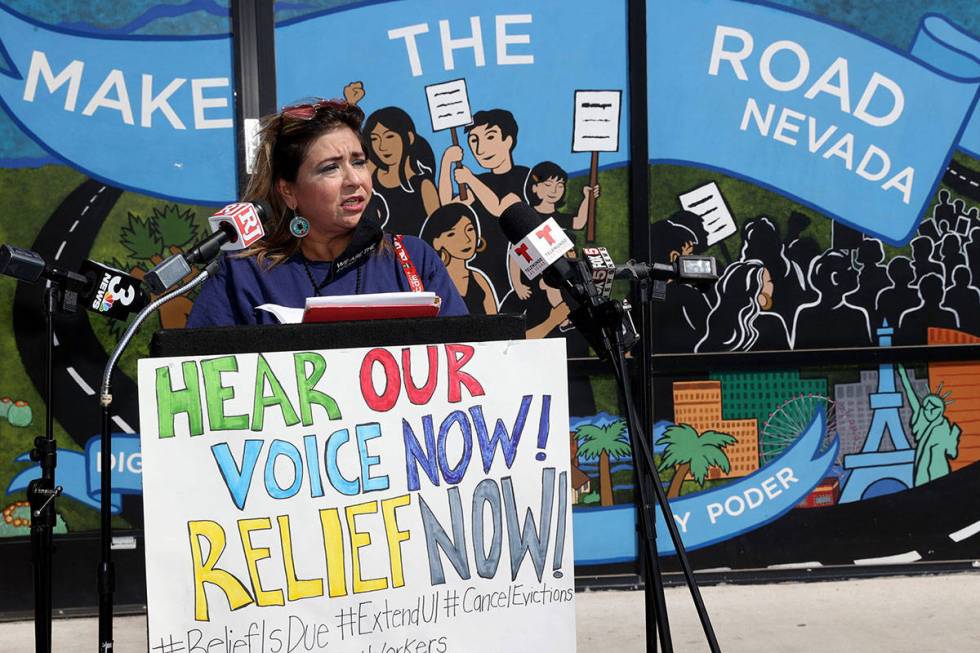Fearful of eviction? Here’s how to avoid it.

Nevada’s eviction moratorium lifts Thursday, but a federal residential eviction moratorium is in effect through the rest of the year. But there’s one catch: Tenants have to opt in.
The federal order came from the Centers for Disease Control and Prevention, and if renters believe they are eligible, they must sign this CDC declaration form and give it to their landlord or property manager. Landlords aren’t required to notify tenants about the CDC order but “must comply with all requirements of the order,” according to CDC guidelines.
The department makes it clear that tenants are still required to pay their monthly rent, as it will accrue along with any fees. Landlords can also still charge late fees, which in Nevada may be no more than 5 percent of a tenant’s monthly rent.
Eligible
Tenants eligible to use the CDC order to stave off an eviction must be able to declare:
— That they have used their best efforts to seek out all available government rent or housing assistance.
— That they will have earned no more than $99,000 in annual income for the calendar year 2020, or $198,000 if filing a joint tax return; were not required to report income in 2019 to the IRS; or received a stimulus check as part of the federal coronavirus stimulus bill.
— Are unable to pay their full rent because of a layoff, reduced wages or work hours, substantial loss of household income or “extraordinary out-of-pocket medical expenses.”
— Eviction would force the tenant to be homeless or move into a shared living situation because they have no other available housing options.
Not eligible
Those who are not considered eligible under the order are renters:
— Engaging in criminal activity while on the premises.
— Threatening the health or safety of other residents.
— Damaging or posing an immediate and significant risk of damage to property.
— Violating any applicable building code, health ordinance, or similar regulation relating to health and safety.
— Violating any other contractual obligation, other than the timely payment of rent or similar housing-related payment, including nonpayment or late payment of fees, penalties, or interest.
But that’s not all …
Landlords are subject to steep fines of up to $500,000 and even jail time if they violate the order, but it’s unclear at what point in the process a landlord would be held in violation.
Brad Lewis, director at Nevada Supreme Court Access to Justice Commission, said “each case will be independently reviewed and decided by the judge of jurisdiction.”
Because there have not been any court cases related to the CDC order, it is unclear when a judge would consider a landlord in violation of the moratorium.
And a recent state law creating a residential eviction mediation program could keep cases out of the court system, possibly further delaying clarity.
The state’s temporary residential eviction mediation program is meant to help resolve tenant and landlord disputes while easing the number of people in the state’s courthouse.
The mediation program starts Thursday and is only for nonpayment-of-rent evictions — when a tenant receives a seven-day notice to leave or pay rent — though judges can refer other types of eviction cases to mediation if they choose.
A mediator works with the landlord and tenant, at no cost to either party, to resolve their dispute such as working out a payment plan, or even rent relief, so both parties avoid a court-ordered eviction process. The mediator is also able to have representatives from other departments join the process, if necessary. For example, if tenants are unable to pay rent because they have not received their unemployment insurance benefits, the mediator can bring in a representative from the Department of Employment, Training and Rehabilitation to resolve issues preventing payment.
Tenants who receive a seven-day nonpayment notice can request mediation when they file their answer to an eviction notice with the local justice court. Landlords and property managers are also able to request mediation.
If either party decides not to attend mediation, then the eviction case proceeds.
Contact Subrina Hudson at shudson@reviewjournal.com or 702-383-0340. Follow @SubrinaH on Twitter.